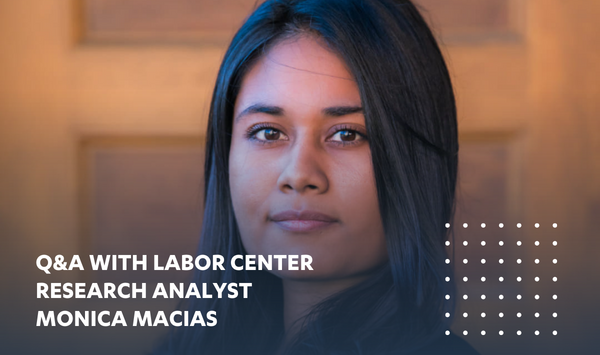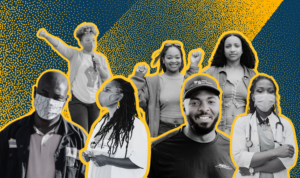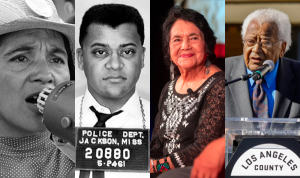Q&A with Labor Center Research Analyst Monica Macias

Research is pivotal to the work of the UCLA Labor Center. Through reports analyzing the most pressing issues impacting low-wage industries — including homecare, nail salons, and fast food — our research team uplifts the daily experiences of frontline workers.
Monica Macias is one of the researchers who serves as the backbone of these projects. When first joining the UCLA Labor Center as an undergraduate intern in 2016, Macias contributed to a study that details the adverse impacts of unpredictable scheduling on retail workers in Los Angeles. In 2018, Macias graduated from UCLA with a bachelor’s degree in sociology, and in 2021 she became a Research Analyst at the UCLA Labor Center. We talked to her to learn about her journey to becoming a full-time researcher.
Why is labor research important to you?
My family. I’m a first generation college student. My parents immigrated here from Sayula, Mexico. My mom has worked at El Pollo Loco for numerous years, since I was a kid. She is also involved in many campaigns, like the Fight For $15 with SEIU. Over time I’ve gotten to hear those stories, and I know what it is like to not be valued, to experience wage theft, to work so many hours, to work two jobs and still not make enough to make ends meet. So when I get to interview people for the UCLA Labor Center’s research and hear more of those experiences, I realize how important this work really is for this community of people that I care about.
Can you tell me a little bit about your undergraduate work-study experience?
I was hired as a work-study student at the UCLA Labor Center toward the end of 2016, and I was pretty much with them the whole time I was a student at UCLA. It was a great research experience. The Labor Center gives work-study students the opportunity to really dive in-depth into the different stages of research.
I worked on a study that looked at the unstable scheduling practices in the retail industry within Los Angeles. We surveyed retail workers across stores such as Ross and Ralphs. There was an opportunity for me to give input on creating the questions for the survey, gather feedback from the community, be involved in the process—and learn what that looks like in terms of community-based participatory research. I learned about this type of research in school and read about it, but I learned it the most while doing it at the Labor Center.
What motivated you to apply for the work-study position?
I transferred to UCLA as a psychology major. I wanted to be a clinical psychologist and work with people one-on-one. But when I got to UCLA and took a couple of psychology classes as part of the Transfer Summer Program (TSP), I got to learn about social justice and macro-scale issues, and how research can play a role in impacting and making change. I realized that I’m somebody who really likes research methods, statistics, things like that, and I’m good at it. My interest started to shift from the micro to the macro.
I had initially applied for an unpaid research internship at an organization. They had pre-hired me, but then they decided to reject me because I had a few misdemeanors. Of course, I was very sad and disappointed at the time because those misdemeanors happened a long time ago, and I was already at UCLA, so for them to reject me was hard for me.
I started going through my UCLA portal to check out what work-study positions were available, and I saw the Labor Center had a research position open. I applied, they interviewed me, and it was a perfect fit.
Was there a significant moment during your work-study experience that was impactful to you?
Getting to see the last stages of writing up the report: collecting all the data, analyzing it, and finally putting it into tables. Getting to write in the report and knowing my mentor and supervisor gave me the opportunity to be published with them was significant, even to this day. I had the opportunity to have an influence, and my experience had value and weight.
Can you tell me about the research you’re doing now?
I’m currently working on two different studies. One of them is on cannabis. We’re studying the employment conditions in the cannabis sector. It’s the first report of its kind — this hasn’t happened before, where a study looks at the employment conditions in this kind of sector. We’re currently creating the survey and getting feedback from the community and organizations that are involved in this line of work.
The other study is on ports, and we’re studying the impact of automation on jobs at the ports, on the environment of the ports, and on the community around the ports. We’re currently speaking to a panel of stakeholders in that area to see what it is we want to specifically measure in order for us to create the survey and start asking questions to the populations we determine are of interest.


